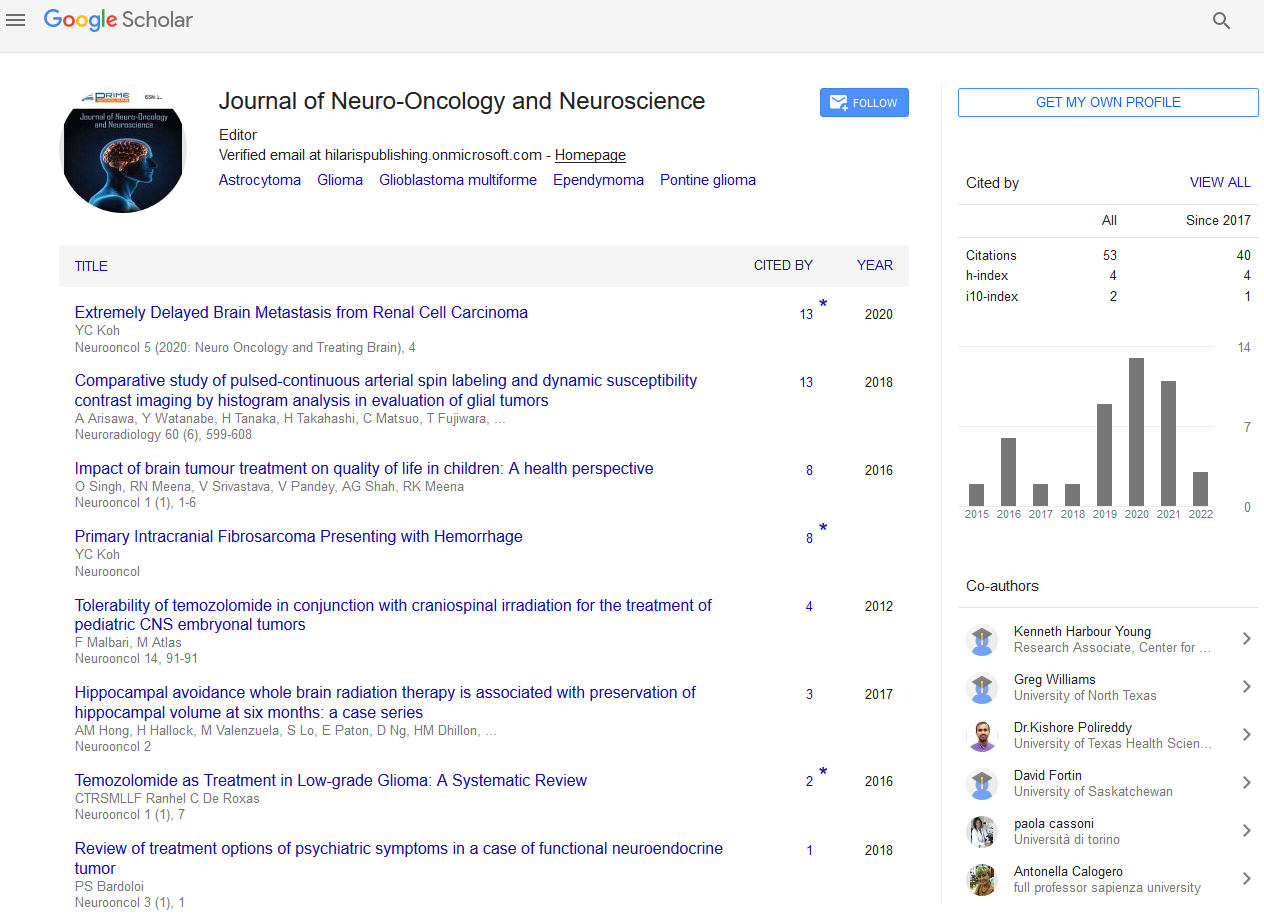Perspective - (2024) Volume 9, Issue 2
Advancements in Integrating AI and Machine Learning in Neuro-Oncology
Elijah Tejada*
Department of Neuro Oncology, University of Oxford, United Kingdom
*Correspondence:
Elijah Tejada,
Department of Neuro Oncology, University of Oxford,
United Kingdom,
Email:
Received: 29-May-2024, Manuscript No. IPJNO-24-20748;
Editor assigned: 31-May-2024, Pre QC No. IPJNO-24-20748 (PQ);
Reviewed: 14-Jun-2024, QC No. IPJNO-24-20748;
Revised: 19-Jun-2024, Manuscript No. IPJNO-24-20748 (R);
Published:
26-Jun-2024, DOI: 10.21767/2572-0376.9.2.14
Introduction
The integration of Artificial Intelligence (AI) and Machine
Learning (ML) in neuro-oncology is revolutionizing the
diagnosis, treatment, and management of brain tumors. These
technologies are enhancing precision medicine, improving
patient outcomes, and paving the way for innovative approaches
in research and clinical practice. This article explores the
advancements in integrating AI and ML in neuro-oncology
and their impact on the field. One of the most significant
advancements in neuro-oncology is the use of AI and ML to
improve the accuracy and speed of brain tumor diagnosis.
Traditional diagnostic methods, such as histopathology and
imaging, are being augmented by AI algorithms that can analyze
vast amounts of data with remarkable precision. AI-driven
tools can differentiate between various types of brain tumors
by analyzing imaging data from MRI and CT scans. These tools
use deep learning algorithms to detect subtle patterns that
may not be visible to the human eye, leading to earlier and
more accurate diagnoses.
Description
ML algorithms can predict how patients will respond to
different therapies by analyzing genomic, proteomic, and
clinical data. This enables oncologists to customize treatment
plans, selecting the most effective drugs and therapies for
each patient. For example, AI can identify patients who are
likely to benefit from targeted therapies or immunotherapies,
optimizing treatment efficacy and minimizing side effects.
Neurosurgery for brain tumors is highly complex and requires
meticulous planning. AI is enhancing surgical planning by
providing detailed, 3D reconstructions of brain anatomy and
tumor boundaries. These reconstructions help neurosurgeons
visualize the tumor in relation to critical brain structures,
improving surgical precision and safety. AI and ML are also
being utilized for predictive analytics and patient monitoring
in neuro-oncology. Predictive models can forecast disease
progression, recurrence, and patient survival based on
historical and real-time data. These models help clinicians
identify high-risk patients and intervene early to prevent
adverse outcomes. Moreover, AI-powered monitoring systems
track patients’ symptoms, treatment responses, and overall
health status. Wearable devices and mobile health applications
collect continuous data, which is analyzed by AI algorithms to
provide actionable insights. This continuous monitoring allows
for timely adjustments to treatment plans and enhances
patient care. The drug discovery process in neuro-oncology is
being accelerated by AI and ML. AI algorithms can analyze large
datasets to identify potential therapeutic targets and predict
the efficacy of new drugs. This speeds up the identification of
promising drug candidates and reduces the time and cost of
bringing new treatments to market.
Conclusion
The advancements in integrating AI and ML in neuro-oncology
are transforming the field, offering new possibilities for diagnosis,
treatment, and patient management. These technologies are
enhancing precision medicine, improving surgical outcomes,
and accelerating drug discovery. As AI continues to evolve, it
holds the promise of further revolutionizing neuro-oncology,
ultimately improving the lives of patients with brain tumors.
The future of neuro-oncology is bright, with AI and ML at the
forefront of innovation and progress. While the integration
of AI and ML in neuro-oncology offers numerous benefits, it
also raises ethical considerations and challenges. Ensuring
the privacy and security of patient data is paramount, as is
addressing potential biases in AI algorithms.
Citation: Tejada E (2024) Advancements in Integrating AI and Machine Learning in Neuro-oncology. Neurooncol. 9:14.
Copyright: © 2024 Tejada E. This is an open-access article distributed under the terms of the Creative Commons Attribution License, which permits unrestricted use, distribution, and reproduction in any medium, provided the original author and source are credited.

